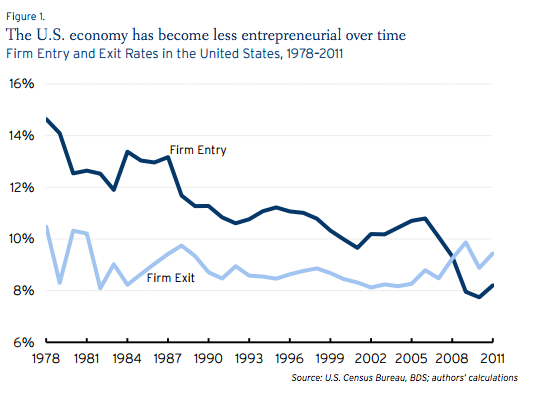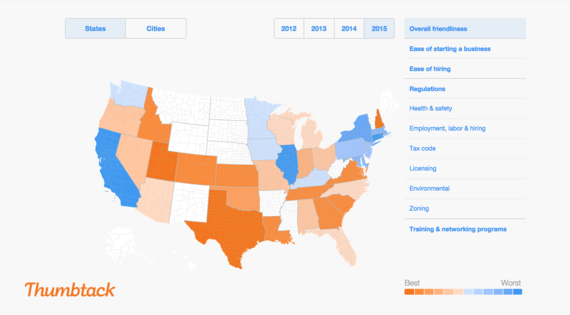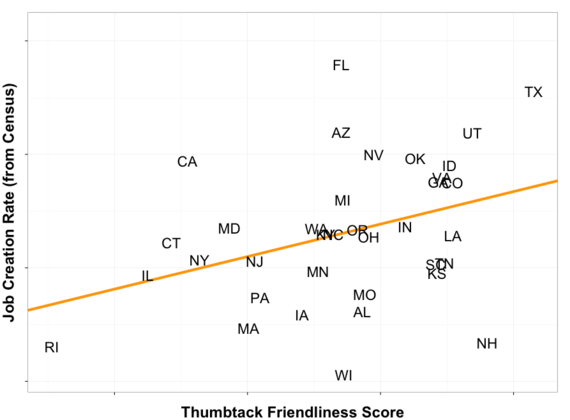Thumbtack recently released its 2015 Small Business Friendliness Survey. Built from survey responses from nearly 18,000 small businesses nationwide, we graded every state we could from best (Texas) to worst (Rhode Island), and found three simple things that can help drive local governments to be more friendly to small businesses -- and none of them are "leave me alone."
Offer Training: Some conventional wisdom might suggest that the government does best that does least, but when it comes to local for support for small business, this isn't always the case. Many small business owners struggle to get their business off the ground and find new customers, only to be intimidated into inaction by the complex web of regulations that cities and states require them to navigate.
Many of the most successful local governments in our survey preempt these challenges by providing useful training programs for aspiring small business owners. The presence of this kind of program was the single most important predictor of whether or not an entrepreneur thought their state or local government was friendly to them. These programs, offered either by the local government or local civic organizations like the Chamber of Commerce, can help people who've developed an expertise in their vocation -- whether its plumbing or web design -- improve their business models, better understand their markets, and learn about new technology.
Simplify Licensing: Even the best training programs can't help entrepreneurs if the bureaucratic red tape they're facing is too thick. We found that the second most important issue for small, service-based businesses is the burden of licensing regulations they face in their cities.
While a common perception may be that business owners are rugged individualists who don't want anyone telling them what work they can and can't do, many small business owners actually are strongly supportive of professional licensing rules as a form of consumer protections (or as a way of keeping competitors out). For this group, what they want to see from their local governments is better enforcement. Being forced to obtain a professional license and then go and compete with small businesses who haven't bothered is an unfair burden that benefits the scofflaws at the expense of entrepreneurs trying to do the right thing.
That's not to say that even well-maintained piles of red tape aren't annoying. Whether it's getting a business license or enduring hours of continuing education to stay in the good graces of a professional licensing body, complications surrounding business licensing poses a significant hassle for many small businesses across the country. As outlined in a report from the White House earlier this year, to the extent a professional standard setting board is believed necessary, wherever possible a certification program and not a licensing program should be used, and procedural burdens and fees minimized.
 According to this study from Brookings, the U.S. has been getting less entrepreneurial over time.
According to this study from Brookings, the U.S. has been getting less entrepreneurial over time.
Make the Website Useful: Technology has transformed the economy; there's no reason common bureaucratic tasks shouldn't be as easy to do online as booking a service professional. Fortunately, many cities have embraced this and developed a solid, useful web presence. In places like Seattle, small businesses can perform a variety of tasks online, from applying for or renewing their business licenses to using data to better understand their market. Similarly, Tennessee's brand new state website, the old version of which ranked poorly in our survey, offers a great example of how electronic resources can guide aspiring entrepreneurs through the process of getting their business officially off the ground.
One word of caution however: Governments should only invest in their web presence if they're actually willing to do it well. Our survey results show that small businesses are 27% less likely to rate their city as "very supportive" when they've dealt with a government website that was "very difficult" to use than when they haven't dealt with any at all, all else equal. Doing it right and developing a great website leads to evaluations that are 22% better than when small businesses never use a website at all.
Why does all this matter? Multiple sources have documented the severe decline in business start-up rates and the self-employment rate over the recent past. Policy environments that are friendlier towards small businesses are going to be critical for cities and states that want to stem this decline. We compared Thumbtack's Friendliness grades with job creation rates from the Business Dynamics Statistics provided by the Census Bureau and found that friendliness actually matters:
For more details on what small businesses want from their local governments, check out the full survey results at thumbtack.com/survey or check out thumbtack.com/blog/2015-friendliness/ for additional insights.

